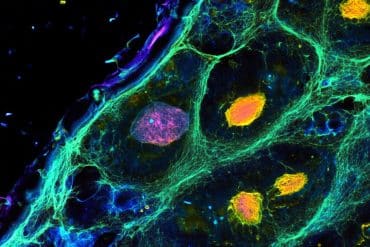Summary: Researchers found that just as certain infectious diseases can cause cognitive problems in humans, infections can also hinder the cognition of animals too.
Source: Hamilton College
Is brain fog a condition limited to humans? “Infectious disease and cognition in wild populations,” a recently published paper in Trends in Ecology & Evolution, answers that question. In a review of the studies, it explores whether learning, memory, and problem-solving are impaired by infection, not just in humans, but in species across the animal kingdom.
Lead author Hamilton College Associate Professor of Biology Andrea K. Townsend had just finished a study in which she looked at how infectious disease affected the problem-solving performance of American crows.
She was surprised by how few studies she could find with which to compare the effects of disease on cognition in other species.
Spurred by the fact that so many individuals have contracted COVID and have experienced brain fog as well as by the goal of bringing all existing studies together for comparison, she collected and analyzed existing studies with her co-authors Kendra B. Sewall and Dana M. Hawley and (Virginia Tech) Anne S. Leonard (University of Nevada, Reno).
They found that species across the animal kingdom, from humans and rats to birds and bees, show signs of cognitive impairment with disease. The reasons for this are variable, including damage by the parasite, immune response to infection, lack of motivation of sick individuals to perform a cognitive task, malnutrition, and even alterations to the host microbiome.
“I think one surprising thing for me was how little is known. We’re seeing an accelerated emergence of all of these infectious diseases, and yet we know very little about how disease might affect cognition and the implications of this for wild animals as well as for humans,” Townsend said.
Cognitive impairment linked to disease have the potential to affect entire ecological communities. For example, bees infected with some pathogens have difficulty learning the smells and colors of the most productive flowers.
“This is really a bad outcome, if you are a bee, because foraging success depends on the ability to efficiently find the most productive flowers,” Townsend added. This could have negative consequences for bee populations, and also for the flowers, which rely on bees for pollination.
As wild animals continue to be affected by a changing climate and disturbed environments, cognitive impairment may exacerbate the effects of disease. In disturbed environments, animals tend to be stressed, and stressed animals are more likely to get sick, which could impair their cognitive abilities.
At the same time, these cognitive abilities could be especially important in these changing, stressful environments, where cognitive abilities (like flexible decision-making and innovation) could give them a behavioral buffer.

“So, here you might have a snowball effect where animals in stressed environments are more likely to get sick and their cognitive abilities are impaired. Then they are less able to deal with these stressful, changing environments because of their impaired cognitive abilities. It could increase the costs of environmental change for some wild animals,” Townsend explained.
“We’re also living in a period of accelerating disease emergence, which is likely to have lots of contributing factors. For example, climate change is altering the range of many insects that carry diseases.
“In North America, the ranges of mosquitoes, ticks, and other vectors are extending northward. This is a problem because these ranges are extending into populations of naive hosts that have never experienced the diseases that they carry before. Therefore, they don’t have immunity to these infections and are likely to be highly susceptible to them,” Townsend said.
Included among the future questions for which Townsend may seek answers are:
- What is the potential for cognitive impairment to hasten or exacerbate population declines as new diseases emerge in wildlife populations?
- How do disease pressures affect cognitive performance at the population level and how does that affect the survival and reproduction of sick individuals within those populations?
- What are the long-term consequences of infection? Do infections that animals experience when they’re young have long-term consequences for their cognitive performance and their fitness?
- How might animals might evolve in response to disease? For example, will the perception of potential disease cues increase in populations with new disease pressures?
About this cognition research news
Author: Vige Barrie
Source: Hamilton College
Contact: Vige Barrie – Hamilton College
Image: The image is in the public domain
Original Research: Open access.
“Infectious disease and cognition in wild populations” by Andrea Townsend et al. Trends in Ecology and Evolution
Abstract
Infectious disease and cognition in wild populations
As infectious diseases emerge and spread in wildlife populations, it is becoming increasingly urgent to understand the implications of infection-linked cognitive impairment for the fitness and populations of wild animals.
A growing body of evidence in humans, animal models, and wildlife indicates that infectious disease can have negative consequences for cognitive performance, arising from parasite- and host-mediated mechanisms.
Cognitive performance can be impaired by infection – sometimes permanently – across a breadth of cognitive abilities, from learning and memory to attention and problem-solving.
Infection-linked impairment of cognitive performance could be particularly detrimental in wild animal populations if cognitive flexibility provides a behavioral buffer in changing environments.







